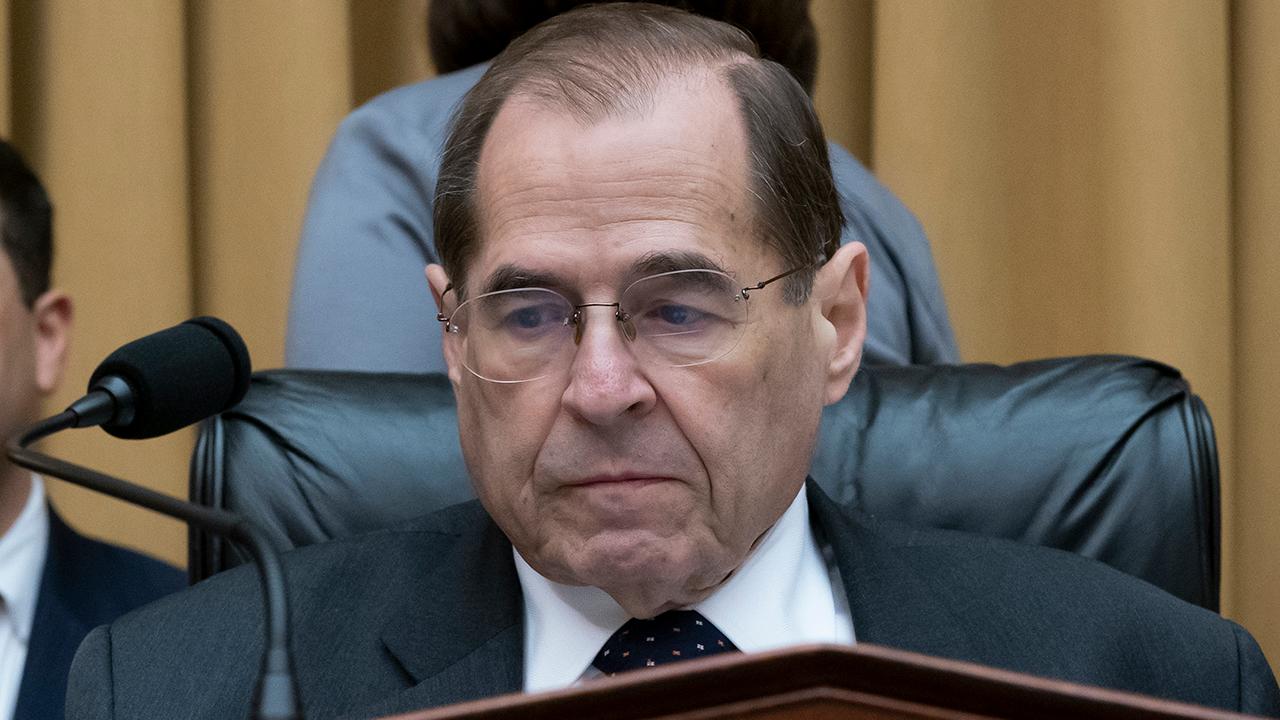House Democrats ready vote to hold Attorney General William Barr in contempt
Democrats threaten to jail William Barr over Mueller report dispute; reaction and analysis on 'The Five.'
CAPITOL HILL – The battle lines are drawn between the White House and House Democrats over the request for documents and testimony.
We’ve heard a lot about impeachment. Now, House Democrats have threatened to hold Attorney General Bill Barr in contempt of Congress.
Don’t forget that one of the articles of impeachment lodged against then-President Richard Nixon in 1974 was his failure “without lawful cause or excuse to produce papers and things directed by duly authorized subpoenas issued by the Committee on the Judiciary of the House of Representatives.”
Impeachment remains off the table for now and is a far cry for House Democrats. But contempt is now in play.
Contempt of Congress – especially criminal contempt – has a rocky history.
A Republican House held Obama-era Attorney General Eric Holder in contempt of Congress over failure to provide documents and information related to the failed gun program known as “Fast and Furious.” During the administration of President George W. Bush, the Democrat-run House voted to hold White House Chief of Staff Josh Bolten and White House Counsel Harriet Miers in contempt of Congress over the alleged politicization of U.S. attorneys.
A Democrat-led House committee also voted for contempt citations for Ford administration Secretary of State Henry Kissinger and Commerce Secretary Rogers C.B. Morton in 1975. A House committee led by the Democrats even approved a contempt citation for Health, Education and Welfare Secretary Joseph Califano, Jr. during the Carter administration in 1978.
In the old days, a “contempt of Congress” resolution had teeth. There were instances where Congress voted to hold figures in contempt and arrested them. But, modern contempt of Congress is seen as a little toothless. You have the legislative branch mad at someone in the executive branch. Both are co-equal branches of government. The only remedy is to go to court – a third, equal branch of government. The battles between House Democrats and Bolten/Miers – and the Republican-led House and Holder – ended in virtual impasses. Courts have struggled with these contempt resolutions. It’s not easy for the judiciary to sort out these disputes and the Constitution provides little clarity when it comes to solving the spats.
Contempt of Congress generates the headlines, but not a lot of action.
In the case of Bolten and Miers, the Judiciary Committee voted in March 2007 to subpoena information tied to the resignation of U.S. attorneys, but the panel didn’t issue the subpoenas for months. The White House exercised executive privilege over information Miers may have held. At that point, Miers was a private citizen, having left her position in the administration.
Then-White House Counsel Fred Fielding wrote to Miers, telling her not to provide information or testimony to the House. The full House voted to slap Bolten and Miers with contempt citations in 2008. Then-Judiciary Committee Chairman John Conyers, D-Mich., filed a lawsuit to compel Bolten and Miers to testify. There was also a criminal contempt effort. But, not surprisingly, the Bush Justice Department told the House it wouldn’t press criminal contempt against the duo in federal court.
The Bush administration took the position that senior White House advisers carried a special level of immunity when the president would assert privilege. A Washington, D.C. federal court ruled that “the asserted absolute immunity claim here is entirely unsupported by existing case law.” The White House argued that such key advisers served as a presidential “alter ego.” The court rejected that characterization. It instead considered top aides as “analytically distinct.”
The Bush years ended with the sides still litigating Bolten and Miers subpoenas and contempt citations, but the parties reached an agreement to provide information in March 2009. By then, voters had seated a new Congress and President Obama occupied the White House. The Democrat-led House ultimately got access to some of the information it sought. Miers testified under oath in a closed-door, transcribed interview, but not at a public hearing.
The House voted to cite Holder with contempt of Congress in the summer of 2012 after the Obama administration exercised executive privilege over documents related to “Fast and Furious.” The House contended the administration failed to comply with a congressional subpoena. After wrangling between Holder and then-House Oversight Committee Chairman Darrell Issa, D-Calif., the panel and later the full House voted to find Holder in contempt of Congress for failing to comply with the subpoena. Mirroring what House Democrats did with Bolten and Miers, the House also approved a criminal contempt resolution for Holder.
HOUSE JUDICIARY SCHEDULES VOTE TO HOLD BARR IN CONTEMPT OF CONGRESS
Not surprisingly, the Obama Justice Department told then-House Speaker John Boehner, R-Ohio, that Holder’s actions did “not constitute a crime, and therefore the Department will not bring the Congressional contempt citation before a grand jury.”
With the civil contempt citation, a federal court agreed to hear the House’s claim. It ruled that not considering the petition could “do more damage to the balance envisioned by the Framers than a judicial ruling on the narrow privilege question posed by the complaint.”
In the Holder-Fast and Furious matter, the courts held that the DOJ had to produce certain documents, but many House Republicans said they weren’t happy with the end product.
The House also voted to hold former IRS Exempt Organizations Division Director Lois Lerner in contempt of Congress for allegedly targeting conservative groups over their tax status. Lerner appeared before the House Oversight Committee in May 2013. She delivered an opening statement but invoked her Fifth Amendment right when it came to answering questions. The panel decided that Lerner had waived her Fifth Amendment right. The House voted to hold Lerner in contempt in 2014.
In 2015, District of Columbia U.S. Attorney Ron Machen told the House he would not pursue a criminal prosecution of Lerner. Machen declared that Lerner did not waive her Fifth Amendment shield when appearing before the committee.
CLICK HERE TO GET THE FOX NEWS APP
Based on history, it’s doubtful House Democrats will get most of what they want – at least not for a while – from the Trump administration.
In a surprising way, the Trump administration’s resistance to the production of some documents and witness testimony could unwittingly help Democrats. It isn’t new ground to witness these disputes between an administration and Congress, but a fight over “contempt” and documents is surely better for Democrats than a row over impeachment. Plus, as history is our guide, Democrats can drag out this fight, undercutting the credibility of the Trump administration, all the way to the 2020 election.







